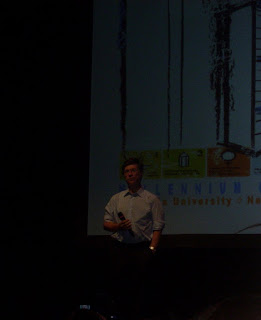Hundreds of undergrad and graduate students gathered together at Columbia University to discuss the progress we are making to reach the Millennium Development Goals (MDGs).
This was one of the greatest experiences of my life; like at least top 15. :) For two days we just sat and listened to speakers discuss development and social entrepreneurship. I think I might have finally found what I want to do after college. That in its self is a miracle.
Plus the soundtrack for the whole conference consisted entirely of The Beatles and John Lennon! :D
Charity: Water
Scott Harrision, the founder of Charity: Water was the first person to speak to us on Sat. He was a super compelling speaker and he has a great story. Seriously, check out the website! His organization has brought clean water to over a million people since 2004 and he isn't planning on stopping anytime soon!

Invisible Children
I'm sure most of you have heard of Invisible Children. It is their mission to end the war in Uganda and the Democratic Republic of the Congo and free the child solders that have been used to fight these bloody civil wars. We heard from a women named Brenda. She was caught in the middle of the Ugandan Civil War, a war that killed her father and doomed her to a life of poverty. Invisible Children was able to give her a scholarship and she was able to go back to school and now she is in her final semester of college and applying to law school.
Engineers w/out Borders
The founder of Engineers Without Borders-USA, Bernard Amadei, spoke about how we need to change our view of poverty reduction.It is no longer enough to give a man a fish or even to teach a man to fish. We need to begin to build fishing industries. He had two main points on which he believes we should focus our efforts: 1)create stable and secure communities through participatory efforts and 2) provide appropriate and sustainable technologies. He then explained about another type of poverty that is even more crippling than what we usual consider. This is what he calls internal poverty; when some one is poor in spirit and lacks the will to participate in real change. He challenged us all not only to stand up to poverty but to walk until it doesn't exist.
Jeffery Sachs
Jeff Sachs in one of the world's leading development economics and is currently the UN Secretary Generals Special Advisor on the MDGs. This man is a fantastic speaker. I didn't take as many notes as I wished I had because I was so enthralled at what he was saying and applauding him every two seconds. He basically talked about how there is a massive deficit of political will in the world today to reach the MDGs. He explained that development is all about peace yet the US government spends $800 billion a year on defense (military, weapons, secret ops, surveillance). The government is willing to spend a trillion dollars to invade a country but when they have to spend a million to send children ARV drugs (a type of HIV medicine) all the sudden they get all nervous about spending their money. He explained that it would take a massive social movement, on par with civil rights, to move the government to action.
Bill McKibbin
This guy started 350.org; the organization that is pushing to to reduced carbon in the atmosphere back to 350 ppm in an effort to slowing climate change. He has been a personal hero of mine since I saw him on the Colbert Report last year. He was a really funny guy and really passionate. Check out 350.org and see how you can get involved in the movement toward alternative energy.
Ahmed Djoghlaf
He is the Executive Secretary of the Convention on Biological Diversity. "We are undermining the capacity of the world to sustain life." Never has anyone been so blunt.
Adam Braun/Pencils of Promise
Just one thing I want to share from his talk. He gave us 7 lessons that he had learned through his life that I really connected with. Yes, they are sappy and motivational but powerful nonetheless.
1) Get out of you comfort zone.
2) Speak the language of the individual you want to become. Not "I want to do it" but "I will do it"
3) Embrace those late, sleepless nights
4) To achieve the unreasonable you have to become an unreasonable person.
5) Just go. Find a way to achieve your dreams.
6) Find your cause and live it.
7) The impossible can be made possible. "Live not in dreams, but in contemplation of a reality that is perhaps the future".
(The dude with the mic is Bobby Bailey (founder of Invisible Children). Adam is the guy with the sling.)
The Global Poverty Project
Check it out!!! I would tell you more about it but I really don't feel like writing anymore. :p
And finally, don't forget the special video message from Justin Bieber. I'm not even joking.
This almost ruined it for me...I will not leave you with the Bieber. You can thank me later.










